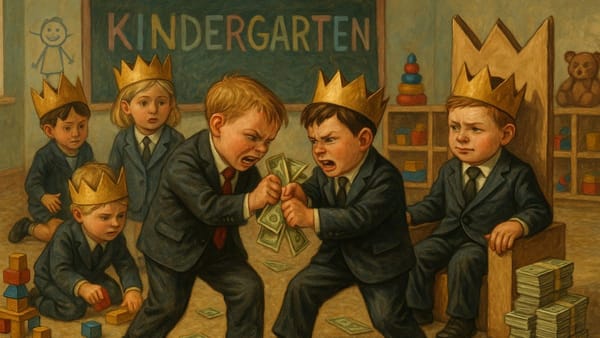Social media is a strange place, and sometimes even the biggest nonsense, like a random one-line tweet with unsolicited life advice, can go viral. God knows why, but it happens. And basically, there's nothing wrong with that.
But If you're active on social media, I'm sure you have encountered accounts that go viral or at least super popular nearly every time they post something. And I'm not writing about celebrities or similar accounts with millions of followers. It's about relatively small accounts that somehow get insane traction just from the beginning of their activity or from a certain point of the activity.
And I bet you sometimes wonder how it happens.
The first thought that comes to mind is that they just get lucky. Sure, that's a safe assumption and the least harmful one. However, the biggest danger is when you blindly assume that they got there because of the incredible value they produce or any other good characteristics. That's dangerous if you're an ordinary social media user, and it makes you anxious if you're a creator like me.
The comforting lie of value and hard work
If you are a creator, this false assumption initially motivates you to add value, work harder, and improve. You're trying to shape your thoughts better on Twitter and understand trends on TikTok and Instagram. You watch videos on how to be better, do better, and be like these popular accounts.
This ultimately leads you to burnout and depression because all this effort leads to nothing. Maybe you doubled or tripled your results, but you are still far from any meaningful results that can actually support your work.
But what if I told you it was never about value, work ethic, or other good characteristics? Then, it might be depressing. But at least it's a relief from one of the biggest lies of our era — the illusion of value built on false social proof, which is especially evident on social media.
Of course, some creators still grow rapidly because of their creativity, talent, or value. Okay, great, but now, idealism aside, what might be this magical source of rapid growth in times when everything is just a price tag?
Inside the quiet machinery of engagement
Let me show you a paraphrased description (I don't want to quote and advertise them) from an online store with quite an intriguing offer:
"We all just care about getting our tweets noticed so that we can build an audience and monetize our content, right? If you haven't discovered it yet, the true key to rapid growth on X lies in leveraging communities."
Read this sentence a couple of times, and remind yourself of these moments when you tried to articulate your thoughts in the sharpest way possible to finally get recognized and grow your profile. Or when you tried to stand up for something and were ignored. Still wonder why?
Well, let me explain this sweet procedure.
These "leveraging communities" are more commonly known as engagement groups. In short, these are closed and paid communities, usually on communicators like Discord, where you share your content and engage with other members' content. Each member has a certain amount of shares daily and must meet the requirements of daily engagement to stay in the group. Of course, if you pay more, you can share as much as you want, and you don't have to engage with others — all lights on you. If you can afford that.
In other words, these groups are all about creating an illusion of value through social proof — likes, retweets, or positive comments on group members' posts. The illusion works better if the group users' content isn't pure nonsense. Then, it's almost impossible to spot whether certain tweets were boosted this way.
And it's all to exploit ordinary users who fall into that trap — the sales funnel — and waste their money on silly E-Books or other services.
There you have "the key to rapid growth."
The illusion of authenticity and the cost of belief
Oh, and maybe you wonder about the price. The most basic groups, full of wannabe influencers, cost around $20 monthly, and the most advanced ones for wealthy adults with huge egos can cost over $500 monthly.
Of course, the more you pay, the better service you get. And you can safely bet that most of the biggest social media accounts that came from nowhere grew using this "strategy." Some of them openly admit it — just ask them. In fact, these groups are one of the golden tricks they sell in their silly e-books. Creators who get far with this trick sell it to smaller accounts, and then the smaller accounts grow and do the same. And it goes on.
You might say, "Hey, there's nothing wrong with such a service if I produce value and want to attract more attention to my content."
But it's wrong, and I'm sure that social media platforms — it's not only about Twitter (X) — are trying to fight that. After all, such groups manipulate social media algorithms (which value engagement) to then exploit users with fake social proofs. And they get too much organic traffic on these lies.
There is a solid difference between engagement hacking and advertisements because ads are quite well-regulated (especially in the EU) and marked as "AD" or "promoted content." Therefore, we know we engage with promoted content, and there is no confusion about why something is popular or recommended, as we know that someone just paid for it — that it's not organic.
We don't have that information for posts boosted by engagement groups. Sure, if you are a creator, you can probably spot sketchy accounts. But you're not their target. Their target is a regular, vulnerable user who can fall into the trap and, after consuming some silly content for a while, can become their customer.
The worst part is that people who join such groups don't try to enlighten other people with their philosophy and spiritual knowledge. They don't promote literature or anything of value. Most, if not almost all of them, cover topics like wealth, productivity, and all the other capitalistic nonsense. They only care about their interests — first, recouping the investment costs of participating in such a group, and then profit.
They post empty cliches about accumulating wealth, trading, or crypto, which (amplified by the group) gain hundreds of likes per post and tons of new followers. Finally, they put "the super formula to [get what you want]" in their bio and count sales.
Fake entrepreneurs exploit unaware working-class people who spend money on such products in hopes of improving their lives. And all they're buying is a bag of lies. That's what it's all about. Of course, engagement groups are also used in politics. In one way or another, people exploit such groups to generate profit or power. It's awful.
When the system rewards emptiness
Also, you can't justify the awful procedure by saying that every creator hacks engagement. It's a completely different story when you post your content and then support others, engage with others, and get some activity back. Because that’s what social media are meant for — to connect people.
And if you grow organically, that is, by being active in a certain community and producing actual value people want to see, that's good for you. Congratulations. The problem with engagement groups is that people want to skip the need to interact with others and want to put themselves on a pedestal instantly.
Lastly, engagement groups simply hurt other creators who use social media to connect with their audience or to find new audiences. As in many other situations, normal people lose, honest people suffer, and dishonest people profit. Oh, dear capitalism. Unfortunately, I don't see any remedy to stop it. All we can do is be more cautious about who we follow and spread awareness of the issue.
💙 Thanks for reading. If you enjoy my work and want more like this, consider supporting it. This space is 100% reader-funded — essays and research take time. You can subscribe, contribute, or explore reading lists I curate. Every bit of support helps.







